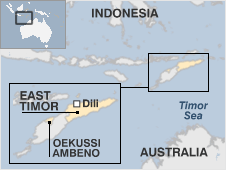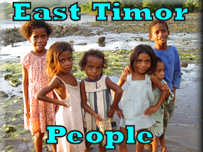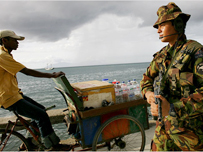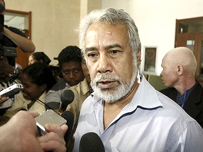Generic Medicines
Taj Pharma is the largest generic pharmaceutical company in India. We hold top positions in different established markets worldwide generics markets..
 system for the procurement, storage and distribution of pharmaceuticals.
system for the procurement, storage and distribution of pharmaceuticals.
Crown Agents established a new Autonomous Medical
Stores Organisation (AMS), developed a 5 year strategic plan
for its development and recruited and trained
Timorese
managers to run AMS following the completion
of our assignment. Our team also conducted a national
drugs needs assessment, adopted a new distribution
system and drug information database, completed
an international tender for a year's supply of drugs and
medical sundries, prepared manuals for procurement and stores operating procedures and trained AMS and district health facilities staff in inventory and warehouse management and ordering techniques.
East Timor's road to independence - achieved on 20 May 2002 - was long and traumatic.
The people of the first new nation of the century suffered some of the worst atrocities of modern times.
An independent report has said at least 100000 Timorese died as a result of Indonesia's 25-year occupation which ended in 1999.
Indonesia invaded shortly after Portugal withdrew in 1975 and forcefully tried to subdue a resentful people and guerrillas fighting for independence.

East Timor reparations both symbolic and material
|
World powers were accused of contributing to the subsequent calamity by turning a blind eye or by actively supporting the occupation by supplying weapons.
Indonesia finally agreed in 1999 to let the East Timorese choose between independence and local autonomy. Militia loyal to Indonesia apparently assisted by the military tried in vain to use terror to discourage a vote for independence.
When the referendum showed overwhelming support for independence the loyalists went on the rampage murdering hundreds and reducing towns to ruins. An international peacekeeping force halted the mayhem and paved the way for a United Nations mission which helped East Timor back onto its feet.
The rebuilding of East Timor has been one of the UN's biggest success stories.
The UN Mission of Support in East Timor Unmiset wound up in May 2005.
But security has been precarious. An outbreak of gang violence in 2006 prompted the UN Security Council to set up a new peacekeeping force Unmit. The UN said poverty and unemployment had exacerbated the unrest.

Unrest in 2006 led to the deployment of peacekeepers
|
As one of Asia's poorest nations East Timor will rely on outside help for many years. The infrastructure is poor and the country is drought-prone.
However vast offshore oil and gas fields in the Timor Sea hold much potential. East Timor and Australia have agreed to share revenues from the reserves. As a part of the deal a decision on the disputed maritime border in the area was deferred.
East Timor is trying to foster national reconciliation. Indonesia and East Timor set up bodies to bring the perpetrators of the 1999 violence to justice. However a 2005 UN report concluded that the systems had failed to deliver. The Indonesian special court acquitted most of the 18 indicted suspects.
President: Jose Ramos-Horta
Jose Ramos-Horta a Nobel Peace Prize winner and former prime minister became president following elections in May 2007.

Jose Ramos-Horta seriously wounded in a 2008 shooting
|
He gained nearly 70% of the vote. His rival the speaker of parliament Francisco Guterres conceded defeat.
Mr Ramos-Horta said five years of hard work lay ahead. He promised to work for the poor and to foster national unity.
Mr Ramos-Horta spent two decades in exile and was a key figure in East Timor's campaign for independence.
In early 2008 he was shot by rebel soldiers in what East Timor leaders described as an attempted coup. He was taken to hospital in Australia in a serious but stable condition and returned to take up his duties in April.
He succeeded independence hero Xanana Gusmao who was chosen by an overwhelming majority in polls in April 2002 to be the fledgling country's first head of state. The role is mainly ceremonial.
Prime minister: Xanana Gusmao
Independence hero Xanana Gusmao was named new prime minister in August 2007 sparking violent protests from supporters of the former ruling Fretelin party which promised to challenge the decision in court.

East Timor's Prime Minister Xanana Gusmao
|
President Ramos-Horta chose him as premier breaking a political impasse following inconclusive parliamentary polls in June.
Fretilin won 21 seats in the 65-member Parliament well short of a majority. Mr Gusmao's party won 18 but formed a coalition comprising 37 seats.
Mr Gusamao who was the country's first president is revered by many in East Timor for leading the armed resistance to Indonesian rule.
He set up the National Congress of East Timor's Reconstruction (CNRT) in 2007 to wrest power from Fretilin.
East Timor's national public radio and TV services launched in May 2002 replacing the interim broadcasting services operated by the UN.
Public radio is said to reach some 90% of the population; public TV has a smaller coverage.
Community radio stations play a key role in the process of national reconstruction. Many of them receive funding training and equipment from international agencies and organisations.
East Timor has two daily newspapers and a number of weekly titles. BBC World Service programmes in English and Portuguese are available in Dili via BBC 105.9 FM.
The press
Television
Radio
Radio Timor Kmanek (RTK) - Catholic Church radio
AFRICA | ASIA-PACIFIC | AMERICAS | EUROPE | MIDDLEEAST | SOUTHASIA
![]()
![]()
![]()
Mauritania Mauritius Morocco Mozambique Namibia Niger Nigeria Republic-of-congo Rwanda Sao-tome-and-principe Senegal Seychelles Sierra-leone Somalia South-africa Sudan Swaziland Tanzania The-gambia Togo Tunisia Uganda Australia Brunei Burma Cambodia China East-timor Fiji Indonesia Japan Kazakhstan Kiribati Kyrgyzstan Laos Malaysia Marshall-islands Micronesia Mongolia Nauru New-zealand North-korea Palau Papua-new-guinea Samoa Singapore Solomon-islands South-korea Taiwan Tajikistan Thailand The-philippines Tonga Turkmenistan Tuvalu Uzbekistan Vanuatu Vietnam Antigua-and-barbuda Belize Bolivia Brazil Canada Chile Colombia Costa-rica Cuba Dominica Dominican-republic Ecuador El-salvador Grenada Guatemala Guyana Haiti Honduras Jamaica Mexico Nicaragua St-kitts-and-nevis St-lucia Suriname Trinidad-and-tobago Uruguay Venezuela Albania Andorra Armenia Austria Azerbaijan Belarus Belgium Bosnia-hercegovina Bulgaria Croatia Cyprus Czech-republic Denmark Estonia Finland France Georgia Germany Greece Hungary Iceland Ireland Italy Latvia Liechtenstein Lithuania Luxembourg Macedonia Malta Moldova Monaco Montenegro Norway Poland Portugal Russia San-marino Serbia Slovakia Slovenia Spain Sweden Algeria Egypt Iran Iraq Israel-and-palestinian-territories Jordan Kuwait Lebanon Libya Mauritania Oman Saudi-arabia Sudan Syria Tunisia United-arab-emirates Yemen Afghanistan Bangladesh Bhutan India Nepal Pakistan Sri-Lanka The-Maldive